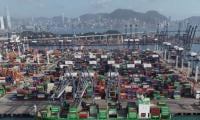The Gwadar deal
It was February 2013, two and a half months before the national elections, when the PPP government – under extreme pressure from powerful circles – handed over Balochistan’s most strategic and useful piece of coast and port, Gwadar, to the China Overseas Port Holding Company (COPHC).
To date, the details of this mysterious deal – including agreement, tenure and operational modalities – remain undisclosed. There are countless reasons that show that the mysterious handing over of Gwadar is not only illegal but also goes against the principles of federalism.
In fact, the current bitterness among the Baloch towards Islamabad is a result of repeated insensitive decisions that have badly affected Baloch society, economy and social values. The Gwadar saga is a recent addition to such policies; it has further cemented the Baloch mistrust of the unfair and unjust system of governance in the country.
In 2007, former president Pervez Musharraf gave management and operational control of the Gwadar Port for a period of 40 years to a three-week-old company PSA Gwadar Pte Ltd. Later, in February 2013 the same agreement was transferred to the COPHC by the PPP government in violation of the Pakistan Public Procurement Rules and the IMF’s Code of Good Practice.
During the agreement process, Ministry of Port and Shipping officials deliberately misled both the media and the public and created the impression that a world-class operator, the Port of Singapore Authority, was taking over Gwadar. However, the name ‘Port of Singapore Authority’ does not appear anywhere in the Concession Agreement signed in 2007.
The concession agreement was signed with PSA Gwadar Pte Ltd which is linked to Abdul Karim Dhedhi, a Karachi-based business tycoon, and National Logistics Cell. Interestingly, the company did not even exist at the time of bidding; the bidding was done by its ‘sponsors’.
Another bizarre act in the $270 million deal was that, contrary to the constitution and law, the Gwadar Port Authority in its statutory capacity didn’t enter in to the agreement. The procedure was adopted by a non-statutory body known as the Gwadar Port Implementation Authority.
It is also worth mentioning that the government deliberately generated business for the concession holder by diverting Karachi-bound urea cargo to Gwadar, and so causing substantial loss to the public exchequer.
Soon after that another powerful segment within the establishment started looking for ways to transfer control of Gwadar to the Chinese without going through a transparent process. The agreement was challenged in the Supreme Court. Both parties knew that the agreement was mala fide and the names of culprits involved in this scam would be brought to the book.
An out-of-court settlement was managed and PSA Gwadar Pte Ltd transferred their rights/shares to the Chinese company despite a Supreme Court stay order which clearly restricted the company from transferring any rights and immovable property of the Gwadar Port Authority to another party till the final decision of the court.
The government of Balochistan raised serious concerns that it had neither consented to the handover of Gwadar to PSA Gwadar Pte Ltd nor were they consulted on the issue of taking it back from PSA.
In a nutshell, the agreement COPHC is holding in its hand under the CPEC umbrella is the same mala fide agreement.
The current 50-year lease with the Chinese port operator does not qualify for even very basic procedures of Pakistani law and constitutional procedures. It is a blatant violation of national laws, including the IMF’s Revised Code of Good Practices on Fiscal Transparency.
Livid over Islamabad’s decision of February 2013, of handing over Gwadar to the China Overseas Port Holding Company (COPHC), Balochistan’s centralists and nationalists including governor Nawab Zulfiqar Ali Magsi termed the agreement as illegal and unconstitutional.
Referring to Article 154 (1) of the constitution, he demanded that matters that were important for the federation or the country as a whole, such as ports and shipping or water, a Council of Common Interests (CCI) would make decisions not ‘individuals’.
A senior official of the government of Balochistan said that, despite repeated requests, the federal government has refused to share details of the contract concerning the lease period, use of the port, management mechanism, cost and revenue sharing – and the most important aspect about the future of the local population, the environmental impact of the agreement and security arrangements.
Meanwhile, as a former legislature from Balochistan, I personally communicated with Ahsan Iqbal and the Planning Commission asking them to access and share with us the Gwadar agreement signed with the Chinese so as to explain our perspective through an informed position. But to no avail.
During a seminar on the CPEC recently in Lahore, Ahsan Iqbal categorically disclosed that without China’s permission no agreement on the CPEC, including Gwadar, can be made public or shared with the government of Balochistan. The minister’s statement in Punjab’s capital speaks volumes about smaller provinces and their ill-fated future.
The agreement is heavily prejudiced against the interests of Balochistan and lends extraordinary discretion to the concession holder.
It is very unfortunate that when genuine Baloch representatives demand transparency on agreement and deals as key stakeholders, they are immediately labelled as anti-development and anti-state because of the sacred nature of Pak-China relations.
Indeed, the Baloch people are fully supportive of the commercial operationalisation of the Gwadar Port. However, handing over the port without transparency and the prior consent of the people of Balochistan is not acceptable.
Balochistan and the people of Balochistan are the major stakeholders in the development of Gwadar and the CPEC process. As a federating unit they have the first right to have clear access and right to debate, deliberate and be a signatory in a process that is related to their future socio-economic prospects.
Islamabad must immediately cancel transfer of PSA Gwadar’s Concession Agreement to China’s COPHC.
In addition, port and shipping related matters should be transferred to provinces and all such matter decisions must be deliberated in Parliament and approved by the Council of Common Interests.
In accordance with the Pakistan Public Procurement Rules and the International Monetary Fund’s Revised Code of Good Practices, an international tender must be floated to invite world-class operators to bid for the operation of the Gwadar Port.
The government of Balochistan must be a shareholder in port operations. And it must be ensured that the Baloch people’s social, economic and demographic concerns are addressed through fresh constitutional, institutional and administrative arrangements.
Gwadar should be declared a military-free zone and no port operator or its parent country should be allowed to deploy their forces there. This will promote economic environment and encourage global investors to invest in Balochistan.
Our Chinese brothers and sisters must not forget that land and coast are sacred to each and every nation. In the South China Sea, China and Japan are sparring over five tiny islands. If the small Diaoyu Islands are a matter of pride and principle for China and Japan, then Gwadar is also a matter of life and death for the Baloch.
Any unilateral decision by Islamabad concerning the fate of Gwadar will be opposed by all segments of Baloch society and will ultimately lead to escalation of conflict in an already volatile province.
The writer is a former senator from Balochistan.
Email: balochbnp@gmail.com
-
 ‘Miracle On Ice’ Redux? US Men Chase First Olympic Hockey Gold In 46 Years Against Canada
‘Miracle On Ice’ Redux? US Men Chase First Olympic Hockey Gold In 46 Years Against Canada -
 Friedrich Merz Heads To China For High Stakes Talks In An Effort To Reset Strained Trade Relations
Friedrich Merz Heads To China For High Stakes Talks In An Effort To Reset Strained Trade Relations -
 Astronauts Face Life Threatening Risk On Boeing Starliner, NASA Says
Astronauts Face Life Threatening Risk On Boeing Starliner, NASA Says -
 Hailey Bieber Reveals How Having Ovarian Cysts Is 'never Fun'
Hailey Bieber Reveals How Having Ovarian Cysts Is 'never Fun' -
 Kayla Nicole Looks Back On Travis Kelce Split, Calls It ‘right Person, Wrong Time’
Kayla Nicole Looks Back On Travis Kelce Split, Calls It ‘right Person, Wrong Time’ -
 Prince William And Kate Middleton Extend Support Message After Curling Team Reaches Olympic Gold Final
Prince William And Kate Middleton Extend Support Message After Curling Team Reaches Olympic Gold Final -
 Nvidia CEO Praises Elon Musk, Calls Him An ‘extraordinary Engineer'
Nvidia CEO Praises Elon Musk, Calls Him An ‘extraordinary Engineer' -
 Shia LaBeouf's Mugshot Released After Mardi Gras Arrest On Battery Allegations In New Orleans
Shia LaBeouf's Mugshot Released After Mardi Gras Arrest On Battery Allegations In New Orleans -
 Timothee Chalamet Felt '17 Again' After Reunion With 'Interstellar' Director Christopher Nolan
Timothee Chalamet Felt '17 Again' After Reunion With 'Interstellar' Director Christopher Nolan -
 Conan O'Brien Speaks First Time After Rob Reiner's Killing
Conan O'Brien Speaks First Time After Rob Reiner's Killing -
 Giant Tortoise Reintroduced To Island After Almost 200 Years
Giant Tortoise Reintroduced To Island After Almost 200 Years -
 Eric Dane Drops Raw Confession For Rebecca Gayheart In Final Interview
Eric Dane Drops Raw Confession For Rebecca Gayheart In Final Interview -
 Trump Announces New 10% Global Tariff After Supreme Court Setback
Trump Announces New 10% Global Tariff After Supreme Court Setback -
 Influencer Dies Days After Plastic Surgery: Are Cosmetic Procedures Really Safe?
Influencer Dies Days After Plastic Surgery: Are Cosmetic Procedures Really Safe? -
 Eric Dane Confesses Heartbreaking Regret About Daughters' Weddings Before Death
Eric Dane Confesses Heartbreaking Regret About Daughters' Weddings Before Death -
 Nicole 'Snooki' Polizzi Reveals Stage 1 Cervical Cancer Diagnosis
Nicole 'Snooki' Polizzi Reveals Stage 1 Cervical Cancer Diagnosis



